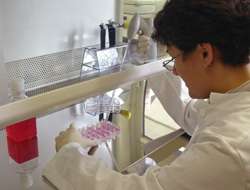Credit: Thinkstock
Regulation of gene expression is essential to make sure cell maturation occurs as it should. European research is taking an integrated perspective on how selected steps in liver and blood cell differentiation can be modulated.
Gene regulation mechanisms are active at every level of development, from the passage of stem cell through to differentiated cell. On from there to maintenance of identity of the mature, functioning cell, regulation is maintained through cellular memory mechanisms.
The "Integrated approaches to study gene regulation during cellular differentiation" (Integer) project is aiming to investigate all levels of gene regulation with a multidisciplinary and integrated approach to research. Specifically, during cell differentiation study, regulation of trans-acting factors and genetic material has come under the microscope.
Protocols established by Integer include 4C or 3C ChIP sequencing and RNA-binding protein immunoprecipitation (RIP) sequencing. For visualising intra-nuclear associations, cryo-FISH imaging techniques were used. Appropriate cell lines were established for the planned genomic work and, to analyse the sequencing data, software tools were refined and optimised.
The main achievement of the Integer project to date is the characterisation of binding patterns in differentiating liver and red blood cells. Several novel genes were identified that are regulated by these factors. Included are a Dnmt3a1 isoform that acts primarily as a negative but also a positive transcription regulator in mouse embryonic stem (ES) cells. Three-dimensional (3D) folding of both the active and inactive X-chromosome in ES cells was also analysed.
Training and dissemination are also at the top of the agenda in the Integer project. To date, Integer has held two highly successful workshops on chromatin proteomics and genomics in parallel with workshops on project management and bioethics.
The Integer project is expected to elucidate many mechanisms in transcription during gene regulation of chromosome and nuclear 3D structure. Relevant epigenetic changes, an important source of modification for genetic material such as methylation and sumoylation, are also being studied.
The wide academic and training network of the Integer project promises to provide answers to the secrets of genetic regulation of development for the benefit of healthcare. With an equal stress on interdisciplinary training of early stage researchers, Europe will remain at the cutting edge of biomedical research initiatives.
Provided by CORDIS




















